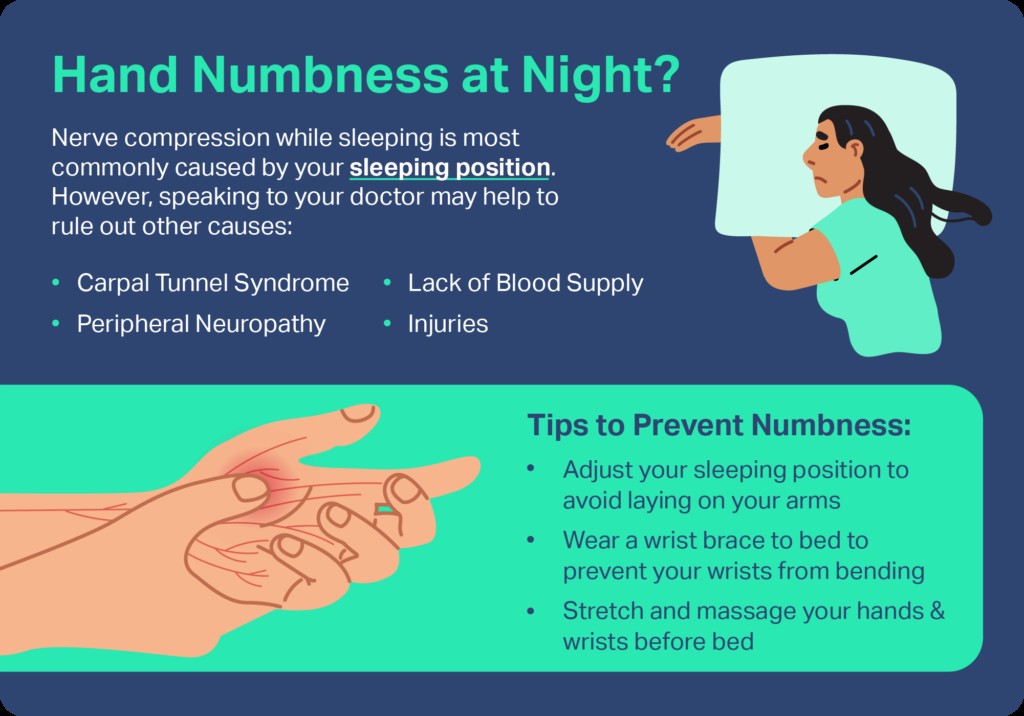Waking up with numb hands, or nocturnal paresthesia, is a common experience affecting roughly a third of adults. While occasional numbness isn’t usually a cause for concern, persistent or disruptive symptoms warrant investigation. This article explores the common causes of hand numbness during sleep and offers potential solutions.
Common Causes of Numb Hands While Sleeping
Hand numbness and the accompanying tingling or “pins and needles” sensation often stem from nerve compression, nerve damage, or other nervous system interference. Understanding the root cause is crucial for effective relief and long-term nerve health.
Sleeping Position and Nerve Compression
Certain sleeping positions can compress nerves in the hand, wrist, arm, or elbow, leading to numbness and tingling. This compression, or reduced blood flow, occurs when you sleep with:
- Curled wrists: Bending your wrists inward can put pressure on the nerves.
- Hands under head/face: This position directly compresses the nerves in your hands and arms.
- Head on forearm: Similar to the above, this can restrict blood flow and nerve signals.
- Torso on arm: The weight of your body can significantly compress nerves and blood vessels.
- Misaligned spine: A pillow that doesn’t properly support your neck can lead to nerve compression throughout your body, including your hands.
Stomach sleeping is often linked to nerve compression. While research on side sleeping is mixed, some experts suggest it’s the least likely to cause hand numbness, provided your wrists are kept straight.
Carpal Tunnel Syndrome
Carpal Tunnel Syndrome is a prevalent nerve injury causing numbness, tingling, and pain in the wrist, thumb, index, and middle fingers. It arises from inflamed wrist tendons compressing the median nerve. Symptoms often worsen at night and are relieved by shaking the hands.
Carpal Tunnel Syndrome can be caused by injuries or repetitive hand and wrist movements. Individuals with diabetes, rheumatoid arthritis, pregnancy, or an underactive thyroid are more susceptible.
Peripheral Neuropathy
Peripheral neuropathy occurs when damage to peripheral nerves disrupts communication between the body and brain, causing tingling, burning, or numbness in the extremities. Diabetes, infections, autoimmune disorders, vitamin deficiencies, medication side effects, alcohol use disorder, and toxin exposure can all contribute to this condition.
Restricted Blood Supply
Insufficient blood supply to an area can impair nerve function, leading to numbness and tingling. While temporary restriction can result from sleeping position, chronic circulatory problems due to conditions like plaque buildup in arteries, blood vessel inflammation, Raynaud’s disease, or frostbite can cause persistent hand numbness.
Injuries and Nerve Damage
Injuries to the wrist, elbow, or even the neck can damage nerves and cause hand numbness. Whiplash from a car accident or an elbow injury from a fall can potentially lead to nighttime hand numbness.
Alleviating Hand Numbness at Night
Addressing hand numbness depends on the underlying cause. A supportive pillow and mattress can minimize pressure points. Other strategies include:
- Wrist brace: Stabilizes the wrist during sleep.
- Adjusting sleep position: Side sleeping with straight wrists is often recommended.
- Avoid pressure on hands/arms: Be mindful of how your body weight is distributed.
- Stretching before bed: Gentle stretches can improve circulation and nerve function.
If these measures don’t provide relief, consulting a doctor is crucial to rule out underlying medical conditions.
When to Seek Medical Attention
While often benign, hand numbness can sometimes indicate a serious condition. Consult a doctor if you experience accompanying pain, increased urination, rash, dizziness, muscle spasms, or if numbness follows an injury to the back, neck, or head.
Seek immediate medical attention if hand numbness is accompanied by:
- Inability to move body parts
- Uncontrollable arm/hand movements
- Weakness
- Confusion
- Difficulty talking, walking, or seeing
